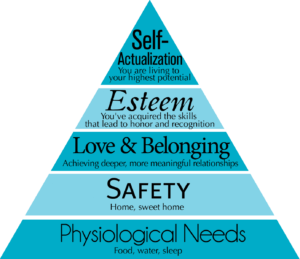
This article is Part 2 of a series written by Dr. Vern A. Cox, Ph.D., an expert in Human Behavioral Theory.
Human Motivation is affected by both rewards and punishment. What is more important for leaders to know is that there are various human needs which drive motivation. In the mid-1900s a psychologist, Abraham Maslow, proposed a hierarchy of needs. He suggested that we must first fill our physiological needs (food, water, clothing, shelter) before we can focus on higher needs. Maslow’s next level of needs is safety (war, natural disaster, violence, job security, financial). When physiological and safety needs are met we can then focus on belonging, esteem (competence, mastery, self-confidence) and self-actualization (continual growth, purpose, contribution). Maslow later amended his hierarchy in regards to self-actualization, saying that the self only finds its actualization in giving itself to some higher goal outside oneself, in altruism and spirituality.
What Maslow’s theory opens up is all kinds of ways to apply rewards. We are not just limited to money as a motivator on the job. Maslow’s hierarchy also suggests that managers consider the various needs of their workers when contemplating why one person is producing more or less than other team members. Production levels can be seriously reduced by unmet needs or significantly increased in an employee whose needs are satisfied. If an employee’s needs are being met at work, either in all or in part, that employee is more likely to stick around longer.
Let’s look at some examples. Suppose one of your employees, because of extenuating circumstances, is not able to meet obligations at home for food and housing costs at their current wage level. That person’s on-the-job focus and performance will suffer greatly. A mutually beneficial solution, if possible, could be to temporarily move this employee to a different position which requires less focused attention on the job. Discussing the reason for the move with the employee prior to taking action will result in a more positive experience for everyone involved. Simply moving that person without having their understanding or buy-in, which may cause further animosity and even less job satisfaction, or having to ultimately terminate the person for lack of performance, are both outcomes where neither side benefits.
For the person who is able to meet physiological needs but has no connections outside of work, belonging to a team at work that works well together may fill that person’s need for connection. Company parties, office breaks where people mingle, or other activities where there is time to develop friendships all help to create a sense of belonging. Workers who feel they belong will be more productive and if the belonging happens at the work place, they will be more connected to that work place. Giving employees the opportunity to feel that they are an essential part of a team or the company as a whole and that they are valued by others within the company will also increase the sense of belonging and hence improve motivation.
People are often demotivated by a lack of self-confidence. Self-confidence results from a sense of competency and mastery of a specific task at hand. At work, an employee’s self-confidence must reside in the employee’s ability to competently perform his/her specific job responsibilities. Adequate training, job modeling and performance reviews (including constructive feedback) all go a long way toward increasing job-satisfaction & productivity and therefore personal motivation & employee longevity.
The feeling that a worker is a part of something greater than him/herself is also powerfully motivating. When employees have a sense of purpose at work that is in-line with their own personal values they are for more motivated to perform at a higher level than when their own values are at odds with those of their employer. When a person’s basic needs are met, he or she will be free to focus on higher goals such as furthering the growth of the company that employs them. The more their basic needs are being met at or by their employer, the stronger the motivation will be for that employee to be loyal to their company. The most successful managers understand that it is in their best interest to fulfill as many of these basic needs of their employees as they possibly can because doing so almost always produces a significant return on investment. In fact, it is typically far more cost-effective to better fulfill the needs of current employee’s than it is to hire new ones.
Dr. Vern A. Cox, Ph.D.
Note: While research has not substantiated the order of Maslow’s needs, the existence of the needs has been shown in various studies. The names or specific hierarchy of the needs may change according to differing studies, but the general categories remain basically the same.
For more information on this article or any others in this series, Dr. Cox can be reached directly at:
vernc@my-healthyliving.net




